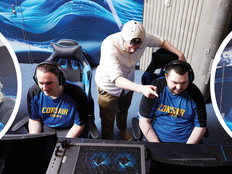New Partnership with ELEAGUE Is a Win for Esports
“Rocket League,” the vehicular soccer video game, doesn’t require a lot of technology to play. With a console or PC, and a controller and an internet connection, anyone who wants to can fire up a match and go head to head with anyone in the world. Where this best-selling game gets more complicated — and where the latest-and-greatest tech makes a difference — is when the battles between rocket-powered vehicles take place within the framework of the Rocket League Championship Series.
The RLCS is one of a growing number of esports events in which elite and professional players vie for cash prizes (more than $1 million, for RLCS events). Players around the world advance through online regional tournaments, with the top 12 teams reaching the Rocket League World Championship, an offline, in-person event in a location that varies each season.
The most recent championship, to determine the winner of RLCS Season 7, was held at the Prudential Center in Newark, N.J., over a three-day weekend in June. Spectators caught the action in the stadium and streamed the play on YouTube and Twitch. By all accounts, the event drew the biggest audience in Rocket League’s history (the eventual winner, a team called Renault Vitality, walked away with $200,000).
What made the event a standout, however — and certainly added to the viewership — was a unique arrangement between the video game’s maker and ELEAGUE.
Recently, that partnership expanded to include CDW, now the Official Arena Partner of ELEAGUE and RLCS. CDW will leverage “Lenovo technology to implement the latest gaming PCs and accessories, perform network capacity and speed assessments, and design rooms and spaces for the optimum player and spectator experience.” The partnership kicks off with Season 8 of the RLCS.
MORE FROM EDTECH: Find out the best CPU specs for your esports program.
In a Booming Esports Industry, Storytelling Matters
In 2015, with the gaming industry on the rise, Turner Sports collaborated with a well-known talent agency to create ELEAGUE, a premium esports tournament and content brand that drives fan engagement with programming and live events it produces.
“We looked at the demographics and the rapid growth in this space, and we saw it as an opportunity we couldn’t afford to miss,” says Jason Scorrano, global director of ELEAGUE Partnerships at Turner Sports.
By May 2016, the new brand was off and running with a tournament for competitive players of “Counter-Strike: Global Offensive.” Matches were broadcast live on TBS, and the tournament culminated two months later when a Russian team, Virtus.pro, beat Swedish team Fnatic.
Early on, ELEAGUE was welcomed by many gamers, and it focused on gathering as much fan feedback as possible, says Scorrano. “We learned a lot in those first few years, but one of the biggest things we took away is that it’s important to connect with fans around an authentic product.”
In the beginning, he says, Turner Sports approached esports the same way it did traditional sports such as football and baseball — highlighting the best matchups and the stories behind the players and teams.
Toward that end, Scorrano says, ELEAGUE completed partnerships with top game publishers to feature other esports, including “Overwatch” and “Call of Duty: Black Ops,” and in October announced a six-part documentary series, ELEAGUE | Road to the Rocket League World Championships. The series will take a deep dive into RLCS Season 7 “from the perspectives of players and their families, including the unique dynamic of how a family participates in an emerging esport athlete’s growing stardom.”
“We’ve turned our focus to elevating esports through storytelling,” Scorrano says. “Through telling the stories of both the players and the fans, or how someone was able to do a certain move, our goal now is to provide value across the board: to gamers who already get the space, but also to an older audience by helping them understand what esports are.”
At about the same time ELEAGUE inked the deal with RLCS, Scorrano notes, it also began working with CDW and, by extension, Lenovo.
CDW had been ramping up its own service of developing college esports arenas, and recognized that a partnership with ELEAGUE would be a logical complement. ELEAGUE executives, in turn, recognized CDW’s expertise and knew it could help them get their project off the ground.
“We started those conversations, and through CDW, we identified Lenovo as a great partner that could check a lot of boxes from a product and technological standpoint,” says Scorrano.
GET STARTED: Learn how to design the right esports program for your campus.
ELEAGUE Gaming Competition Features Lenovo’s Legion Line
From Lenovo’s perspective, says Joshua Wang, the company’s channel account executive for higher education, expanding interest in collegiate esports has mirrored gaming’s growth in the commercial market.
One recent report, by the games and esports analytics firm Newzoo, estimates that the global market for esports reached $1.1 billion in 2019 and will hit $1.8 billion by 2022. An industry analysis by eMarketer predicted that 30 million Americans would watch an esports event at least monthly in 2019, with annual esports viewership exceeding 46 million by 2023.
“Colleges are building dedicated esports arenas for the same reason they’re building NFL-grade workout centers, or dorms that look like high-end condos,” Wang says. “They’re thinking about what will attract students to their institutions, and they’re realizing they need more than Ping-Pong and pool tables if they want to get ahead of their competition.”
Already, more than 170 collegiate esports teams exist in North America, Wang notes, and about 150 U.S. colleges offer degrees in related subjects, such as game design. These students are the same ones watching ELEAGUE content across digital and linear networks, and some may even compete in ELEAGUE matches themselves.
“It’s all tied together: Turner Sports and ELEAGUE, CDW, Lenovo, our customers,” says Wang. “Our footprint within the competitive commercial esports scene is directly related to our footprint within higher education.”
ELEAGUE will use Legion equipment, Lenovo’s dedicated gaming line, in all of its tournaments and programming, Wang notes. The line includes gaming-optimized computers and monitors, as well as keyboards, headsets and other accessories.
“Professional and competitive gaming has a lot of very specific needs for the speed and the accuracy at which the technologies perform,” he says. If the technology is too slow, or the graphics subpar, “you don’t stand a chance — it kind of defeats the purpose.”
Combined with CDW’s expertise in deploying the necessary infrastructure in ELEAGUE’s studios, Lenovo’s gaming technologies provide everything needed for an esports event, Wang says. “It’s the entire package, start to finish.”
Meanwhile, the ELEAGUE team is already developing content for their Season 8 RLCS series (the season’s RLCS World Championship finals take place in Madrid starting December 13), but they’re thinking even further ahead, says Scorrano.
Psyonix, the developer of “Rocket League,” has sponsored a Collegiate Rocket League for college esports teams since 2017. “Maybe we could come in there and help elevate that experience too. That’s what is so exciting about this partnership for us,” Scorrano says. “We have what we need to make things like that happen.”



![] New Partnership with ELEAGUE Is a Win for Esports](/higher/sites/edtechmagazine.com.higher/files/styles/cdw_article_hero/public/articles/%5Bcdw_tech_site%3Afield_site_shortname%5D/201912/esports_0.png.jpg?itok=2nvcMHo1)




